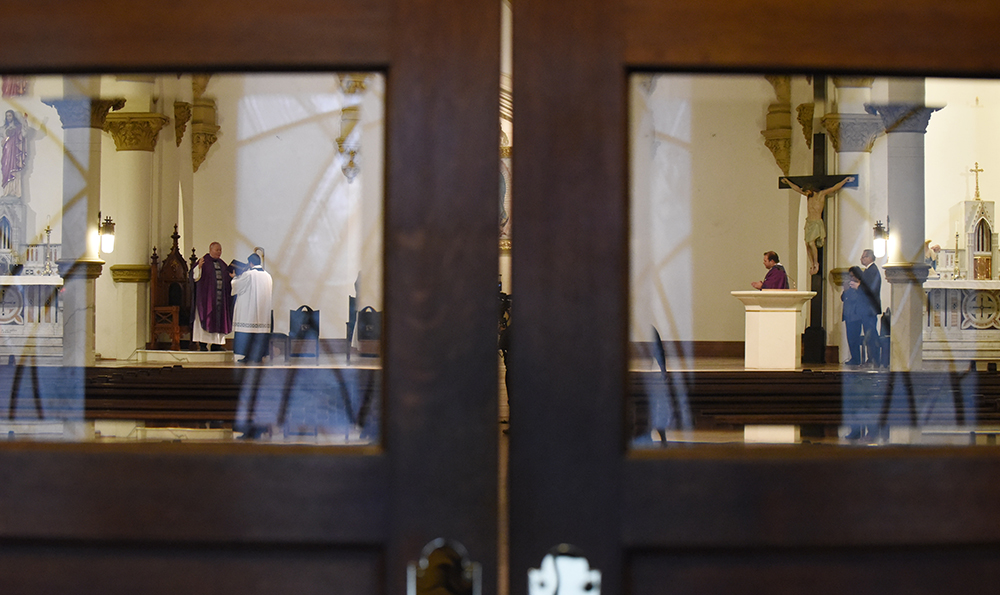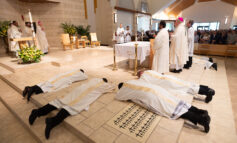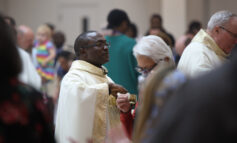
A view behind closed doors as Bishop Edward J. Burns celebrates a livestream Sunday Mass at the Cathedral Shrine of the Virgin of Guadalupe March 22, 2020 in Dallas. The Sunday Mass was livestreamed due to concerns about the spread of COVID-19. (Ben Torres/Special Contributor)
By Father Thomas Esposito
Special to The Texas Catholic
The word “quarantine” as we use it today was first coined in 14th century Venice – the leaders of that most serene watery republic ordered a mandatory period of isolation for people arriving in ships during the Black Death outbreak. A sequence of 40 days — una quarantina in modern Italian — was sufficient, they deemed, to assure that the passengers would not transmit the terrible plague once they went ashore. It has come into English to describe a time of seclusion imposed on those who have been exposed to, or are trying to avoid, disease.
Although we English-speaking folk derive our word “Lent” from a Saxon root, the Latin word denoting the sacred time between Ash Wednesday and the Triduum is Quadragesima — literally, “the 40-day period.” The Spanish language morphed this word into Cuaresma, a season in which we imitate Christ’s 40 days of prayer and fasting as we prepare ourselves to commemorate his death and resurrection. You see, I suspect, where this is going: Catholics can rightly boast of being the kings and queens of quarantine, because for centuries we’ve been isolating ourselves once a year for 40 days, well before the coronavirus made it the hip thing to do!
There is, in other words, a strange and graced overlap between two very different quarantines: we are isolating ourselves to fight the ravaging virus without as we pass through Lent fighting the spiritual viruses within. The 40 days of Lent grant us a privileged chance to imitate Christ, who mirrored Israel’s 40 years in the wilderness as he battled and conquered Satan in the desert (see Matthew 4:1-11). They should also be understood, I think, as an intense encapsulation of life itself, in which we acknowledge the brevity of our mortal existence, our frailty in the face of temptation, the obligation to sacrifice in order to be unselfishly happy, and our ultimate need for an end worthy of our life and love.
Lent focuses our attention on the death of Christ that marks the completion of the season; in like manner, our current quarantine measures necessarily provoke thoughts of our own eventual demise. In both cases, death is not to be regarded as a horrifying specter to shield ourselves from, but rather a reminder that our earthly existence is not the final chapter of our human story. The body is a blessing, a sanctuary deemed capable of welcoming God Himself in the flesh, and must therefore be nurtured and protected from all physical harm. If, however, the excesses of sin and selfishness blind us to the spiritual glory which we were created to experience and aim at already in this life, then the body itself merely becomes a burden, and a source of misery to those too ignorant to realize their composite malady of dust and sin.
Whether this present virus crisis lasts fewer or farther than 40 days, we must treat it as “a favorable time,” as preparation for “the day of salvation” (2 Corinthians 6:2). This quote from St. Paul was proclaimed at the Ash Wednesday liturgy; let us think of “the day of salvation” as our eager pursuit of Easter in this present moment. There is tremendous relief in realizing that the Lord can liberate us from the pressure of living as though tomorrow was the only topic worthy of our worry. Our purpose as men and women created in the image and likeness of God is to rejoice eternally with Christ in the never-ending now of the divine presence. As we wander amid the isolating uncertainties of this quarantine desert, remember that our Lenten observance is a privileged time to accept our mortal frailty and to sacrifice with a generous spirit. Let us, then, entrust our fears in prayerful silence to the divine Physician, who alone can calm our anxious hearts: “Be still and know that I am God” (Psalm 46:11).
Father Thomas Esposito, O.Cist., is a theologian and monk at the Cistercian Abbey of Our Lady of Dallas.



